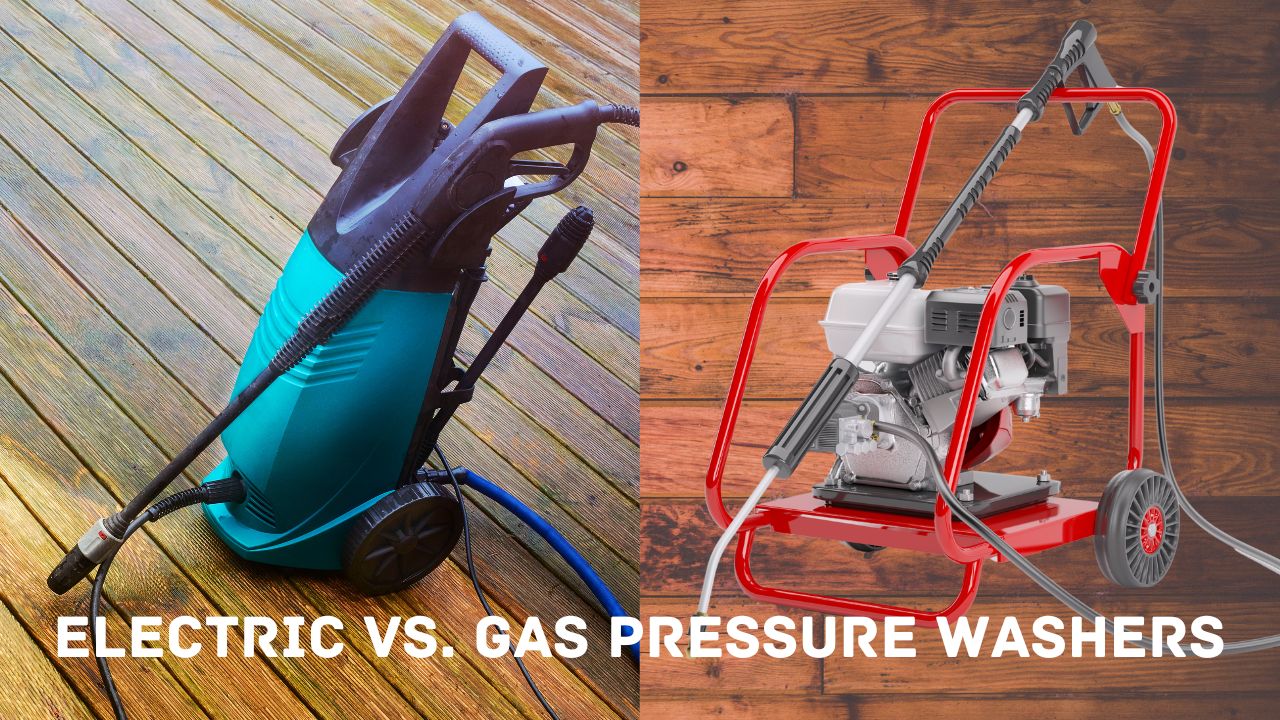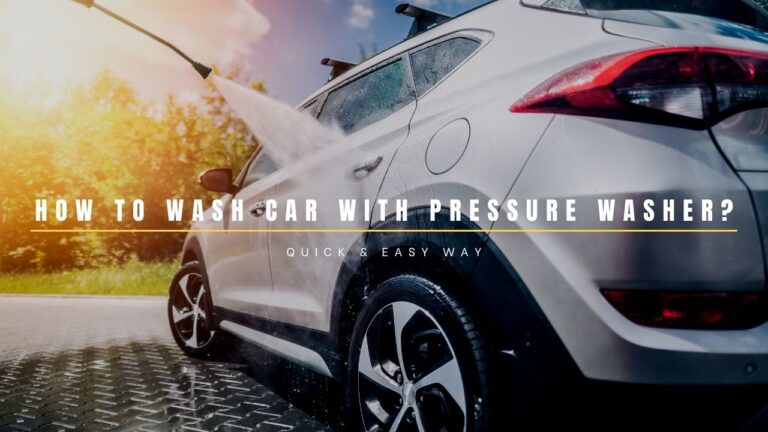Electric vs. Gas Pressure Washers – Which One is Better?
Pressure washers are incredibly convenient tools to make any laborious cleaning job feel like a walk in the park. If you want to purchase one, you might have come across two types of pressure washers – gas or electric model – and might be wondering which one is better.
They both have their advantages and drawbacks. For example, one type is lighter and easier to use, while the other doesn’t keep you restricted to an electrical socket. You might have already realized this if you have used one in the past and are now looking for an upgrade.
So, without any further ado, let’s begin! This article will list some similar characteristics of gas vs. electric pressure washers. These will help you determine which is more suitable for your particular usage.
Gas vs. Electric Pressure Washers – The Quick Answer
electric power washer washers are widely popular for household usage because they have sufficient power for cleaning siding, decking, and especially car washing. They are easier to handle and are budget-friendly as well.
On the other hand, gas-powered pressure washer offer much higher water pressure. They are solid and sturdy and last longer as well. Their high power and durability make them strongly recommended for commercial usage. However, they can cost more upfront, and handling them requires more skill.
The In-Depth Analyses
From the quick answer, we have some idea of a few benefits of each type of pressure washer. But many more under-the-hood features might make you reconsider (or reinforce) your choices. So, here’s a more in-depth analysis of electric power vs. gas pressure washers.
PowerPoint: Gas Pressure Washer
The primary performance indicator for pressure washers is their power, more popularly known as supply pressure. It is given in PSI (pounds per square inch) and is the pressure with which the water is supplied. PSI of a pressure washer is usually one of the first things considered when purchasing a pressure washer.
Flow rate is also considered with pressure. It is given in GPM (gallons per minute) and is the quantity of water supplied. More GPM and PSI means higher power to clean more expansive areas quicker.
Power Comparison
A typical electric pressure washer runs between 500 to 2,000 PSI, while a gasoline pressure washer typically start at 2,500 PSI and can reach up to 4,000 PSI. Therefore, gas pressure washers have the advantage of supplying higher power.
Ease Of Handling – Point: Electric Pressure Washer
The higher power of gas pressure washers is also their double-edged sword, requiring more skills and safety precautions. Even a smaller pressure washer can be hazardous if pointed at people or pets. Thus, better skills are necessary to handle the kick of a high-powered, high-pressure gas pressure washer.
You might already be familiar with the stiffer handling of a fire hose, right? It only has a PSI of between 50 and 200 PSI – much below-pressure washers! Although, the water supply is much greater – up to 50 GPM. In comparison, pressure washers deliver 1-4 GPM.
Range – Point: Gas Pressure Washer
While electric pressure washers are lighter and have better maneuverability, they do keep you limited to an electrical socket. And since most pressure washing occurs outdoors, there are fewer electrical sockets outside.
Gas pressure washers, on the other hand, can be taken anywhere. With a gas pressure washer, you don’t have to risk slipping on your pavement because that’s as far as your cabled electrical pressure washer will allow you to go! Thanks to sturdy rollers and no electrical cable required.
Surface In Question – Debatable, Hard Point: Gas Pressure Washer
The surfaces you plan on washing with your pressure washer will also define which type of pressure washer suits you the most. Now, we don’t want to stay underpowered or go for overkill.
For example, the electric pressure washer will handle household tasks such as washing cars or vinyl siding. But if you want to strip paint off surfaces or clean concrete surfaces, you will need a gas-pressure washer.
However, gas pressure washers are more versatile regarding the surface in question. You can take care of high-pressure tasks. And as for low-pressure tasks, you can use wide-tip nozzles or pressure relief valves to reduce the overall pressure.
So, gas pressure washers can be used on various surfaces. Again, it is only recommended to go for overkill if the excess power will be used and ultimately wasted.
Emissions And Indoor Usage – Point: Electric Pressure Washer
Since gas pressure washers must burn fossil fuels to provide power, their emissions are not very green. Additionally, these emissions can quickly become concentrated in enclosed spaces and fatally toxic. So, gas pressure washers should never be used indoors and in garages.
So, electric pressure washers easily win on this argument. And when renewable energy such as solar or hydro-powered is used, there’s just no debate for gas pressure washers – even when most modern gas pressure washers comply with EPA (Environmental Protection Administration) and several international standards.
Maintenance – Point: Electric Pressure Washer
Electric pressure washers require no complex maintenance apart from simple upkeep. All they need is a general cleaning and preventing the filters from getting clogged up. Also, lubricating the pump once in a while is considered good practice.
Gas pressure washers have more maintenance, mainly because of the gas-powered engine. In addition to the water pump filter, you will also have to clean the gasoline filter. Maintaining oil levels is also necessary so your pump and engine don’t heat up. The engine’s spark plugs also require maintenance or replacement after some while.
Budget Friendliness – Point: Electric Pressure Washer
Most, and even high-tier, electric pressure washers are much cheaper than gas models. However, you can still get the most affordable model, which can be unreliable.
Gas pressure washers, on the other hand, cost more upfront. There are also the ongoing costs of fuel, which are getting more expensive with each passing day!
Durability And Repairability – Point: Gas Pressure Washer
Gas pressure washers tend to cost more but also last much longer than electric pressure washers. A well-maintained gas pressure washer can last up to 10 years, while a typical home electric pressure washer model will be up for replacement in 3-5 years.
Also, electric pressure washers aren’t usually repaired because (a) finding their replacement parts is complex, and (b) the repair might cost as much as the price of a new pressure washer! While gas pressure washers can be repaired, and any part – from the pump and motor to the steel structure – can be replaced easily.
Pros and Cons Of Electric Pressure Washers

Now that we have compared electric and gas pressure washers based on individual features, let’s look at their pros and cons more closely.
Pros
- Highly recommended for household usage
- They are suitable for washing cars, vinyl siding, patios, decking, etc.
- Lightweight
- Which makes them easier to maneuver.
- Compact
- Which makes them easier to store and winterize.
- Eco-friendly
- No fuel or hydrocarbons are emitted. However, if the electricity to your home comes from burning fossil
- fuels, this benefit is rendered useless.
- It can be used indoors.
- Because there are no harmful emissions.
- Affordable
- Electric pressure washers are aimed toward the residential market, and you can find budget-friendly models for as low as $100-$150.
- Quiet and noiseless
- It runs at around 80 decibels (dB), the volume level of household vacuum cleaners.
- No ongoing costs
- No need to keep re-spending on fuel or oil.
Cons
- Low Power
- Covering more expansive areas and removing stubborn stains takes longer.
- Don’t last very long
- As they are kept affordable, cheaper materials, such as plastic, might be used for production. They last around for 3-5 years.
- You need to be near an outlet
- This can limit your flexibility and keep you within the close confines of an electrical socket.
- Aren’t usually repaired
- Repairs are not 100% guaranteed and can cost higher than the cost of a new model.
Pros & Cons Of Gas Pressure Washers

Pros
- High Power
- They are recommended for heavy-duty cleaning as they can supply as high as 4,000 PSI.
- Quick Cleaning
- You can save time as gas pressure washers can cover a wider area quicker and with more power for cleaning.
- Portability
- You can take them anywhere as they don’t require an electrical cable.
- Durable
- They can also be used for longer and are therefore aimed for commercial use.
- Last longer
- They can last up to 10 years.
- Can be repaired
- Finding replacement parts is easy for gas pressure washers as no complex electrical components are involved.
- Recommended for tougher jobs
- Such as washing concrete surfaces and driveways, removing graffiti, stripping paint, etc.
Cons
- Cost more
- Upfront costs and fuel costs add up. However, they can be recovered quickly with commercial usage.
- Hard to maneuver
- Although they have sturdy wheels and can be rolled anywhere, they are still made heavy to compensate for the high power.
- Emissions
- They are dangerous for indoor usage and aren’t very eco-friendly.
- Noisy
- They run around 100 dB; hearing protection is advised for anything above 85 dB.
FAQs
Are electric pressure washers better than gas?
The answer to this question depends on how you use your pressure washer. If it is for light household usage, electric pressure washers are better than gas. If it is for heavy-duty or commercial use, then no!
Do gas pressure washers last longer than electric?
Yes, gas pressure washers usually last longer than electric ones. Gas pressure washers can last up to 10 years, while electric pressure washers can last for around 3 to 5 years. Electric pressure washers from premium brands can last longer than that.
How long do electric pressure washers last?
Generally, electric pressure washers have a life of around 500 hours. With light usage, they can last for as long as five years. However, their life depends on several factors, including material, use, maintenance, and water quality.
Do electric pressure washers work well?
Yes, but it depends on how you use your electric pressure washer. If it is for light-duty tasks (0-1800PSI), such as cleaning outdoor BBQ grills or washing cars, your electric pressure washers will work excellently. Medium-heavy duty tasks require more time, stronger detergent, and higher power. So, a typical household electric pressure washer might not work well.
Conclusion – Which One Is Better?
Both gas vs. electric pressure washers has significant advantages but not many drawbacks. And if there are any shortcomings, they have their workarounds as well.
So, the big question is: which one suits you better?
The easy way to answer this question is to figure out how you plan to use your pressure washer. If it’s around the house, get an electric pressure washer. If you want to use it to clean sidewalks or places that attract more masses, awesome, get a gas pressure washer.
These aren’t the only metrics you should consider when choosing a pressure washer, so here’s more information to help you in this daunting task.







